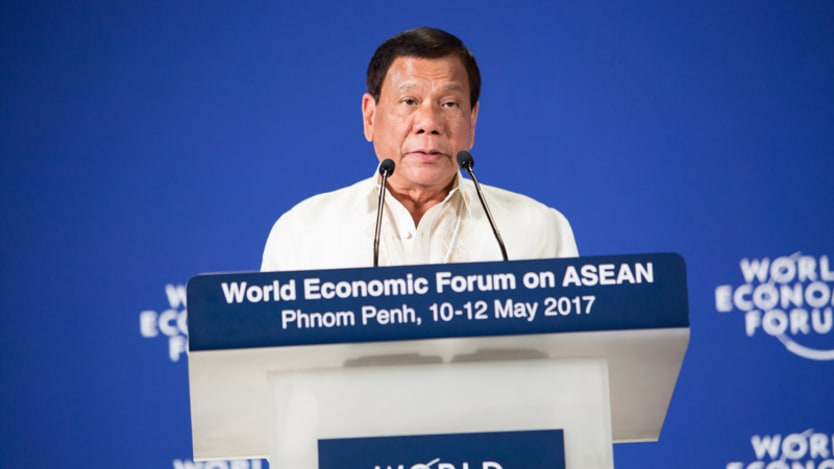
Two days after news broke that the administration of Philippine President Rodrigo Duterte would accept no new European Union grants, there has yet to be any formal statement, and EU officials remain in the dark as to the true terms of such a decision. Amid heightened confusion over the refusal, the multilateral donor has released a video showcasing its array of projects in the Philippines.
Titled EU cooperation with the Philippines: Ties that bind, the video mentions how the EU has contributed over 1 billion euros ($1.1 billion) over the past four decades toward poverty eradication, and in raising standards of living in the Philippines. As if for emphasis, the EU video notes in bold red letters how it is one of the “largest grant donors” in the country.
See more related topics:
► NGOs mixed on impact of US-Philippine tensions for aid
► Second MCC Philippine compact under review due to rule of law, human rights concerns
Under its current seven-year, multiannual framework of assistance to the country, the EU has set aside 300 million euros ($334 million), more than double its previous seven-year commitment. The donor was among the top 10 development aid donors to the country, based on 2015 data analyzed by Devex.
EU support to the Philippines is focused on helping the government meet its electrification goals with a 60 million euro ($67 million) Access to Sustainable Energy Program, supporting the peace process and development in Mindanao, as well as national efforts toward universal health care. The EU also has an 18 million euro ($20 million) Governance in Justice Program, a big humanitarian assistance budget, and several other projects on trade, higher education and fighting cybercrime.
The Philippine government’s decision to no longer accept EU aid grants broke after local news outlets started reporting on the decision Wednesday. But there have yet to be any formal statements coming from the Philippine government on the issue.
No statements have been posted on the EU delegation website either, nor on any of its social media channels. Most of the statements coming from the EU were in response to queries from the media, Thelma Gecolea, public affairs officer at the EU delegation in the Philippines told Devex in a phone conversation.
But even these statements are limited to the Philippines’ general decision to no longer accept new EU aid grants and the over 250 million euro ($279 million) amount that could be possibly be at stake if the Philippine government pushes through with the decision.
It’s unclear as of this writing whether the Philippine government is going to reject all EU aid assistance, or if the decision will spare current active grants and will only apply to new ones. It’s also unclear whether the government plans to reject all forms of EU aid grants, or will only be choosing particular ones that it deems are interfering with national sovereignty.
To the EU delegation’s understanding, the government will no longer accept new grants from them, according to Gecolea. But they have yet to receive a formal written confirmation on this, and thus unable to provide further information that will help flesh out the details of the decision.
According to Gecolea, the decision was relayed to the EU delegation at a meeting on Wednesday by members of the Department of Finance.
Since taking office, President Duterte has delegated matters of socio-economic planning to the heads of the country’s Department of Finance, the National Economic and Development Authority, or NEDA, and of the Department of Budget and Management.
But the decision on EU aid appeared lacking in coordination and consultation across these different departments and others, such as the Department of Foreign Affairs.
Ernesto Pernia, director-general of NEDA, told journalists in an ambush interview following a press conference on the Philippines’ first quarter economic growth at Astoria Plaza in Pasig City, a business district in Metro Manila, how the administration’s economic team was not consulted on the matter, and that he was quite surprised by the decision, GMA News Online reported.
He advised not to take the decision as a “policy” by the government — which he said he plans to discuss with the administration’s economic managers — noting how the Philippines chief has often made comments in reactions to criticisms, but would later backtrack on them.
Robespierre Bolivar, spokesman for the Philippine Department of Foreign Affairs, told the same news outlet Thursday how the department is “still clarifying the matter.”
Presidential Spokesman Ernesto Abella told reporters in a press briefing Thursday that the decision, “approved” by the president, came from recommendations from the Department of Finance for the government not to accept grants from the multilateral donor “that may allow it to interfere with internal policies of the Philippines.” He said the decision is only for grants the government deems interfering in the country’s sovereignty, but can’t or won’t provide specific details on how that will affect humanitarian aid from the multilateral donor, which he said is “usually unconditional.”
The spokesman also wouldn’t identify what specific project or projects triggered the decision, although Carlos Dominguez, the country’s finance secretary, was quoted by CNN Philippines as mentioning a $280 million project that requires a review of the country’s adherence to the rule of law. He did not identify what the project is.
It’s unclear what the project entails, but the EU is currently accepting proposals for a 1.74 million euro ($1.94 million) project aimed at supporting the promotion of human rights as well as human rights defenders, active in pursuing the fight against extrajudicial killings and enforced disappearances in the country. It also provides support to civil society actors engaged in the promotion of freedom of the press, and is expected to extend assistance to members of the media, such as but not limited to journalists, bloggers and broadcasters, particularly those dealing with controversial issues in remote areas of the Philippines. The proposal also aims to support organizations active in monitoring and documenting human rights violations, including that of prisoners.
The deadline of submission is on May 26.
Relations between Duterte and some of the Philippines’ long standing donors such as the United States and the EU have been restrained since the latter two raised concerns on the human rights situation under the current administration. Duterte has previously remarked about rejecting aid from these donors, arguing the Philippines will not “beg for it.”
Read more international development news online, and subscribe to The Development Newswire to receive the latest from the world’s leading donors and decision-makers — emailed to you free every business day.








